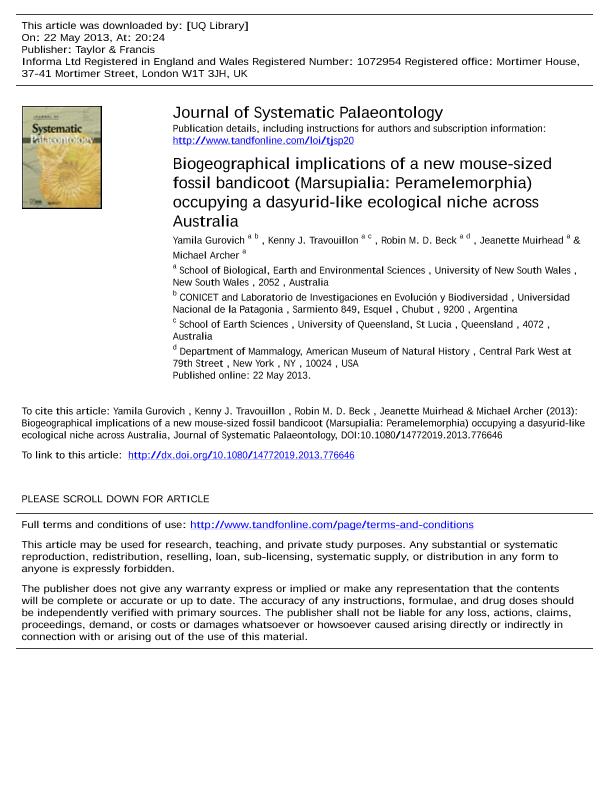Mostrar el registro sencillo del ítem
dc.contributor.author
Gurovich, Yamila

dc.contributor.author
Travouillon, Kenny J.
dc.contributor.author
Beck, Robin M. D.
dc.contributor.author
Muirhead, Jeanette
dc.contributor.author
Archer, Mike
dc.date.available
2016-04-27T14:32:00Z
dc.date.issued
2013-05
dc.identifier.citation
Gurovich, Yamila; Travouillon, Kenny J.; Beck, Robin M. D.; Muirhead, Jeanette; Archer, Mike; Biogeographical implications of a new mouse-sized fossil bandicoot (Marsupialia: Peramelemorphia) occupying a dasyurid-like ecological niche across Australia; Taylor & Francis; Journal of Systematic Palaeontology; 12; 3; 5-2013; 265-290
dc.identifier.issn
1477-2019
dc.identifier.uri
http://hdl.handle.net/11336/5406
dc.description.abstract
We describe Bulungu palara gen. et sp. nov., a new fossil peramelemorphian (bandicoot), based on a single well-preserved skull and additional dental specimens from Late Oligocene to Middle Miocene (Faunal Zones A–C) limestone deposits at the Riversleigh World Heritage Property, Queensland, and two dental specimens from the Early–Middle Miocene Kutjamarpu Local Fauna, South Australia. This is the first fossil peramelemorphian species to be reported from more than a single fossil fauna, with its inferred distribution extending from north-western Queensland (modern latitude ∼19◦S) to north- eastern South Australia (modern latitude ∼28◦S). The presence of Bulungu palara in Riversleigh Faunal Zones A, B and C and in the Kutjamarpu Local Fauna supports the current interpretation that these faunas span similar ages, namely Late Oligocene–Middle Miocene. Phylogenetic analyses of an expanded 74 morphological character dataset using maximum parsimony and Bayesian approaches, both with and without a molecular scaffold, consistently place Bulungu and the Oligo-Miocene forms Galadi and Yarala outside crown-group Peramelemorphia. These analyses also fail to support a close relationship between the Pliocene Ischnodon australis (previously considered the oldest known representative of the extant peramelemorphian family Thylacomyidae) and the modern thylacomyid genus Macrotis. With an estimated body mass of ∼130 g, Bulungu palara is smaller than any known Recent bandicoot from Australia, although some modern New Guinean species are similar in size. The small size and craniodental morphology of B. palara suggest that it was predominantly or exclusively insectivorous, perhaps ecologically similar to small New Guinean dasyurids such as Murexechinus melanurus. Together with the small-bodied (< 100 g), insectivorous Yarala burchfieldi and large-bodied (∼900 g), faunivorous Galadi speciosus, Bulungu palara demonstrates that Oligo-Miocene Australian peramelemorphians filled ecological niches that today are mostly occupied by dasyurids, and that a major faunal turnover event occurred at some point after the Middle Miocene.
dc.format
application/pdf
dc.language.iso
eng
dc.publisher
Taylor & Francis

dc.rights
info:eu-repo/semantics/openAccess
dc.rights.uri
https://creativecommons.org/licenses/by-nc-sa/2.5/ar/
dc.subject
Bulungu Palara
dc.subject
Kutjamarpu
dc.subject
Miocene
dc.subject
Morphology
dc.subject
Phylogeny
dc.subject
Riversleigh
dc.subject
Marsupial
dc.subject.classification
Paleontología

dc.subject.classification
Ciencias de la Tierra y relacionadas con el Medio Ambiente

dc.subject.classification
CIENCIAS NATURALES Y EXACTAS

dc.title
Biogeographical implications of a new mouse-sized fossil bandicoot (Marsupialia: Peramelemorphia) occupying a dasyurid-like ecological niche across Australia
dc.type
info:eu-repo/semantics/article
dc.type
info:ar-repo/semantics/artículo
dc.type
info:eu-repo/semantics/publishedVersion
dc.date.updated
2016-05-06 15:52:43.262787-03
dc.journal.volume
12
dc.journal.number
3
dc.journal.pagination
265-290
dc.journal.pais
Reino Unido

dc.journal.ciudad
Cambridge
dc.description.fil
Fil: Gurovich, Yamila. Universidad Nacional de la Patagonia "san Juan Bosco". Facultad de Ciencias Naturales - Sede Esquel; Argentina. University Of New South Wales. Faculty Of Science. School Of Biological-earth And Environmental Sciences; Australia. Consejo Nacional de Investigaciones Científicas y Técnicas. Centro Nacional Patagónico; Argentina
dc.description.fil
Fil: Travouillon, Kenny J.. The University Of Queensland; Australia. University Of New South Wales. Faculty Of Science. School Of Biological-earth And Environmental Sciences; Australia
dc.description.fil
Fil: Beck, Robin M. D.. University Of New South Wales. Faculty Of Science. School Of Biological-earth And Environmental Sciences; Australia. American Museum Of Natural History; Estados Unidos
dc.description.fil
Fil: Muirhead, Jeanette. University Of New South Wales. Faculty Of Science. School Of Biological-earth And Environmental Sciences; Australia
dc.description.fil
Fil: Archer, Mike. University Of New South Wales. Faculty Of Science. School Of Biological-earth And Environmental Sciences; Australia
dc.journal.title
Journal of Systematic Palaeontology

dc.relation.alternativeid
info:eu-repo/semantics/altIdentifier/url/http://www.tandfonline.com/doi/abs/10.1080/14772019.2013.776646
dc.relation.alternativeid
info:eu-repo/semantics/altIdentifier/doi/http://dx.doi.org/10.1080/14772019.2013.776646
Archivos asociados
